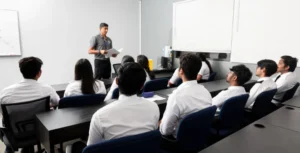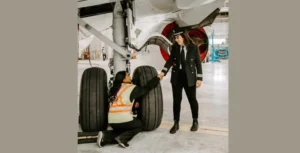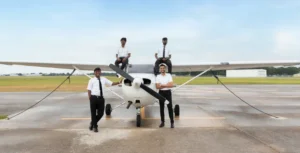Becoming a pilot is a dream many people share, but it’s a career that requires more than just technical training. Experienced pilots, with years of flying under their belts, serve as vital role models for those just starting out. These seasoned aviators not only teach the necessary skills but also offer invaluable insights gained from real-world experiences.
From handling emergencies in mid-air to navigating unexpected weather challenges, learning from their stories can help new pilots grow into confident and capable professionals. In this article, we’ll explore how aspiring pilots can benefit from the knowledge, wisdom, and mentorship of experienced aviators, and why these role models are so important for the future of aviation.
The Importance of Aviation Role Models
Mentors or aviation role models are important to the growth of any aspiring professional and so is applicable to aviation. Since accuracy and people’s security depend on such a job, the employees may benefit from having a role model or a mentor. These seasoned fliers have had them often sometimes or most times and their advice can be of much impeachment to the new, young, or less experienced fliers today on the complexities of aviation, security, and professional development.
Tutoring in aviation is not only the explanation of the procedures of piloting but also guiding one to choose a correct way of living for being a pilot. For example, to give out trained and efficient pilots value systems such as discipline, decision making, and ability to work under pressure. They also promote discipline in respect to the aircraft as well as the passengers on board.
Suggested Read: Common Mistakes Student Pilots Do and How to Avoid Them
Learning from Experienced Pilots

Seasoned pilots who have been flying for many years have valuable knowledge that they can contribute. These pilots have had life experience, some of the elements that may be considered part of life from the weather issues to instances when the aircraft has to land immediately. Some of the key areas where experienced pilots provide invaluable lessons include:Some of the key areas where experienced pilots provide invaluable lessons include:
1. Safety Protocols
The experience of such incidents as the engine failure in the case of Tammie Jo Shults that safely landed the Southwest Airlines Flight 1380 demonstrate the significance of retaining composed demeanor and following proper procedures during emergencies. They have market experience and knowledge such that when added to the perfect adherence of following procedures this becomes the difference between life and death. A majority of experienced pilots are known to insist that safety should always be of tremendous priority, values they pass to the future generation
2. Decision Making Under Pressure
Decision making is one of the most important functions that must be achieved in the aviation field particularly when it comes to decision making under stress. There are times when captains are faced with various challenges, and the time is not on their side, then the lives of all the people that are on board depend on decision-making. Experience brings wisdom about how to adequately risk assessment with optimism in order to learn how to fly. The student is also taught how to think critically in giving an assessment to any situation without necessarily getting nervous.
3. Adaptability
As everyone knows, flying is really not always a piece of cake; it comes with a lot of barriers such as change in weather conditions or a sudden technical hitch. There must be identified role models that have been effective in learning the business and they do teach adaptability. They take time to explain to their mentees how they overcame different obstacles that exist in flying, so that the latter can quickly learn that flying comes with the unexpected and how well they can manage this.
Mentorship Programs in Aviation

When it comes to mentoring in aviation, one can distinguish a variety of types. Traditional structured, organization sarcoplasmic pilot mentorship, mentorship during interviews during a training program, formal associational pilot mentorship, mentorship by a senior pilot, and many more. These institutions include Women in Aviation International WAI comes in handy where it ensures that young pilots have people to turn to for help throughout their working periods.
1. One-on-One Mentorship
A number of the flight schools and airlines provide structured one on one training sessions. In such arrangements, student pilots are bonded with qualified pilots who offer constant instructions throughout the ground and flying sessions. These mentors are crucial since not only it empowers the tutors with know-how but emotional steady-mates as well. It is not easy flying in aviation and having someone who can preach and or demonstrate how to go through the ups and down can be very useful.
2. Online Mentorship and Resources
Due to the increase in the use of websites and social media, there has been a great improvement in the number of pilots who are able to get a mentor online. Some of the information delivery systems that are available include webinars, e-books, and even virtual conferences which go a long way in creating and acquainting pilots with the knowledge that when they have free time, they would like to know. These resources are great, especially for those that do not have the opportunity to spend time with a mentor face-to-face.
3. Networking Opportunities
Mentorship also provides corridors to networking within the aviators’ fraternity. A mentor initially exposes the student pilots to the events that take place in the aviation world, different professionals as well as different jobs. Having a wider network can be important for them to secure internships or other positions that assist in the career progression.
Pioneers Who Have Shaped Aviation

1. Bessie Coleman
Bessie Coleman overcame several obstacles as the first female African American licensed pilot, including discrimination based on gender and race. Her determination to pursue aviation, despite these barriers, makes her an inspiration to pilots today. She proved that with persistence and passion, any challenge can be overcome
2. Jacqueline Cochran
Cochran, the first woman to break the sound barrier, was not only a skilled pilot but also a visionary leader. She played a critical role in forming the Women Airforce Service Pilots (WASP) during World War II, providing women with opportunities in aviation that were previously denied. Cochran’s legacy reminds aspiring pilots of the importance of innovation and courage in advancing their careers
3. Charles Lindbergh
Charles Lindbergh is best known for completing the first solo nonstop transatlantic flight in 1927. Flying from New York to Paris in his custom-built monoplane, Spirit of St. Louis, Lindbergh became a global hero. His daring achievement not only advanced aviation technology but also inspired many to view flight as a viable means of long-distance travel. Lindbergh’s passion for aviation and exploration helped popularize air travel in the United States and beyond.
4. Amelia Earhart
Although known as one of the most famous women in aviation, it’s important to note Amelia Earhart’s significant contributions to the field. In 1932, she became the first woman to fly solo across the Atlantic, further proving that aviation was not limited to men. Earhart’s trailblazing efforts served as an inspiration to both men and women in aviation, and her disappearance during her attempt to circumnavigate the globe remains one of the great mysteries of aviation history.
Conclusion
In conclusion aviation is a challenging yet rewarding career, and learning from experienced pilots can accelerate an aspiring aviator’s growth. Whether through formal mentorship programs, studying aviation pioneers, or tapping into the vast network of online resources, there are countless opportunities to learn from the best. The key takeaway for any aspiring pilot is that the journey is as much about character development as it is about technical skill. aviation role models and mentors provide the guidance, encouragement, and wisdom necessary to navigate the skies safely and confidently. With their support, the next generation of pilots is poised to reach new heights.
FAQ
How can I find a mentor in aviation?
You can find a mentor by joining aviation organizations such as the Aircraft Owners and Pilots Association (AOPA) or Women in Aviation International (WAI). Many flight schools and airlines also offer mentorship programs where experienced pilots guide new students through their training. Networking at aviation events or through online forums is another excellent way to connect with seasoned pilots.
What are some lessons new pilots can learn from experienced aviators?
New pilots can learn critical skills like decision-making under pressure, adherence to safety protocols, and adaptability. Seasoned aviators also teach the importance of staying calm in emergencies, effective communication with air traffic control, and how to prepare for unexpected situations like weather changes or mechanical issues.
What is the best way to start learning from experienced pilots?
The best way to start is by joining a formal mentorship program through your flight school or aviation organization. Additionally, attending aviation conferences, reading pilot biographies, and participating in online communities or forums can help you gain insights from seasoned pilots.
